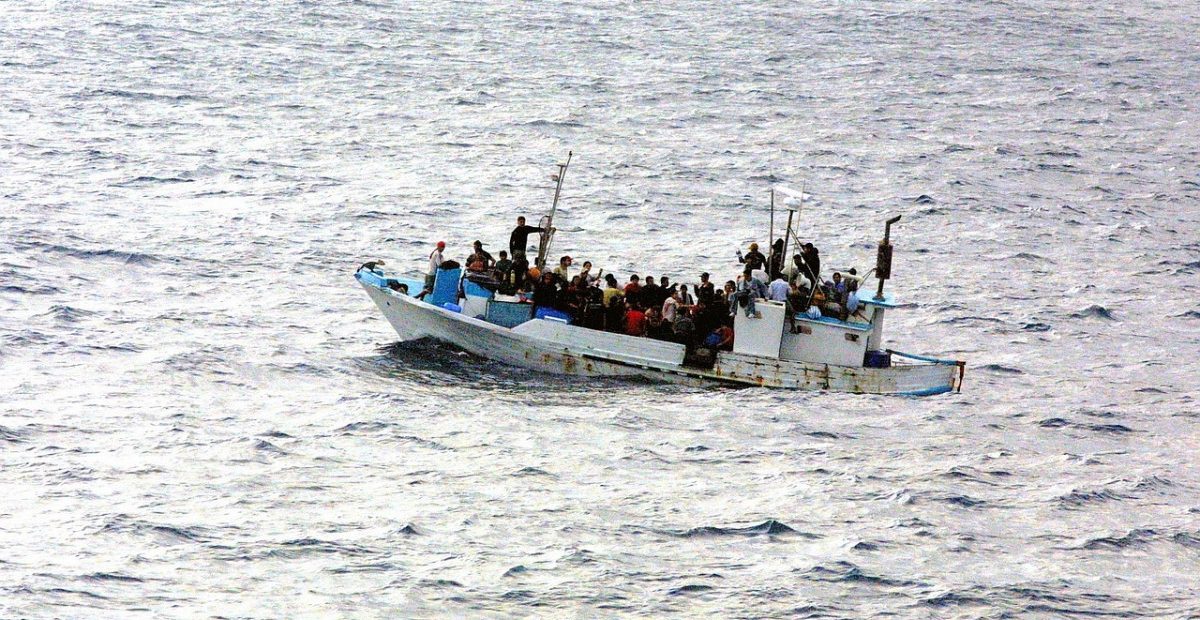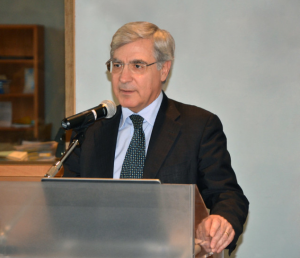
Watch
Migration from the southern shore of the Mediterranean

By Claudia Di Lorenzi
What is the vision from North Africa of the migration towards Europe phenomenon? How is it possible to make it person centred, thus moving from a purely economic to a human vision of migration? Interview with Pasquale Ferrara, Italian ambassador in Algiers, capital of Algeria.
According to the UNHCR*, 75,522 migrants landed by sea on the European coasts of Italy, Malta, Cyprus, Spain and Greece from January 1st to October 21st 2019. In addition, 16,322 migrants arrived by land in Greece and Spain making a total of 91,844 people, of whom 9,270 in Italy, 2,738 in Malta, 1,183 in Cyprus, 25,191 in Spain, 53,462 in Greece. This data shows a decreasing trend (in migration) and documents the emergency phases. It is not however enough so that Europe starts a broad and constructive dialogue on the subject: the prospect of the creation of a European system of flow management remains very remote, and in general the analysis at an institutional level does not take into account the perspective of African countries. In Algiers we joined the Italian Ambassador, Pasquale Ferrara:
Mr. Ambassador, what is the vision from North Africa of the migration towards Europe phenomenon?

Seen from Africa, migration is a historical and structural phenomenon, especially intra-African, because the vast majority of migrant and refugee movements take place between African countries: more than 20 million people live in a country other than their country of origin. Migration to Europe is different and people fear an uncontrolled influx. To speak of migration in terms of differences in development is only part of the picture.
In Europe, a distinction is often made between political refugees and economic migrants. But often African economic migrants are the result of bad political management in countries, because there is a problem of governance, of appropriation of resources by oligarchies, of social inclusion. Therefore, in some way, economic migrants too can qualify as political refugees.
Over and above the issue of illegal migration, as far as North Africa is concerned, it would be necessary to restore in the Mediterranean the circular mobility of populations that has always been observed in history.
It means, for example, the possibility of coming to Europe for a period of study or work, and then returning to the country of origin. At the moment, these movements are subject to the granting of a visa, but it is very difficult to obtain one because of the many and necessary controls. For many people it is challenging, so the temptation of those who receive visas, even if they are well-intentioned, is often not to return to their country of origin. The visa must be maintained, but with a view to encouraging circular mobility, it is necessary to think of a more structured system.
Then there is another factor that stimulates migration, and that is the difference in the quality of services that a society offers: health services and social security services in general, whose lack of availability and quality also influences, together with other factors such as endemic violence, the sense of security, or school services, so that even those who are not in a situation of absolute poverty try to come to Europe to give a better education to their children.
We should therefore invest more in the training of the ruling classes, professionals and educators. In Algiers, even though the numbers are small, we are trying to do so, increasing the scholarships for young Algerians who go to Italy to study music, art, restoration, as an investment for their professional future.
Is the West responsible for the impoverishment of African countries?
I would be very cautious. This is a narrative that is useful for certain Afro-African oligarchies to dismiss their responsibilities when faced with a governance that is dubious in its legitimacy and in its results. The colonial period has marked Africa a lot and the past responsibilities of the West are ascertained, but at least 50 years have passed since decolonization and it is difficult to attribute to the West the problems of today’s African societies. The quality of governance is of great importance.
Rather today in Africa there is a strong presence of China with programs related to natural and mineral resources in almost all countries. China considers Africa a large market, but the exchange is asymmetrical in favour of Beijing. However, to compensate for this imbalance, China carries out infrastructural works, stadiums, theatres and cultural centres for billions of dollars at its own expense.
Europe is taking uncertain steps in managing this phenomenon. There is a lack of Community policies and it seems that the principle of shared responsibility does not warm the hearts of Europe.
The choice of solidarity cannot depend on the good will and changing direction of individual governments. The migration issue must be dealt with exclusively by the European Union as such, as is the case with the trade policies for which the EU states have given Brussels exclusive responsibility for negotiating agreements with non-European countries.
Today, however, on the one hand, because of a matter of national sovereignty, the states want to retain control over migration and borders, and that is understandable. On the other hand, they accuse Europe of inaction, but they do not give it the mechanisms it needs to operate effectively. But it seems to me unlikely that there will be progress in this area, given the resistance that this issue encounters in relation to internal policies.
It has long been said that it is necessary to formally establish a collaboration with the countries of North Africa, but also with those of transit. Good intentions but few concrete facts…
To move on to concrete facts, we must take note of the reality, of the fact that the African countries, especially those of the North we consider transit countries, which are themselves countries of destination for emigration. Egypt is home to over 200,000 refugees on its territory, while in 2018 just over 120,000 people arrived in the whole of Europe.
The few hundred illegal migrants who arrive from Algeria are all Algerians, not sub-Saharan migrants who pass through Algeria, because often these migrants stay here. Moreover, these countries do not accept programs aimed at creating “hotspots” for sub-Saharan migrants. Here the Turkish model does not work, where the European Union has given 6 billion euros to manage camps where more than 4 million Syrian and other refugees are accommodated.
The operation worked in Turkey because there was war in Syria and because of Turkey’s strategic interests. In Africa the phenomena are very different and other ways have to be found.
What forms of collaboration could work?
We don’t need asymmetrical collaborations but equal partnerships. We must bear in mind that it is not only we Europeans who have a migration problem, and so it is necessary to respect these countries with their internal needs, including those of migration. Only then can we try together to manage the phenomenon. For example, there are already cooperation agreements between Italy and Algeria dating back to 2000 and 2009 that work well.
What do they include?
The joint management of the migratory phenomenon in terms of the fight against exploitation and trafficking of human beings, the trans-national criminality that uses the phenomenon to finance itself, the danger of terrorist infiltration. There are also provisions for the agreed, orderly and dignified repatriation of illegal migrants.
There is talk that Western countries must support African countries in order to create better living conditions thus discouraging migration. How viable is this?
Under the current conditions of the international economy and political culture, I see it as impractical and, all in all, ineffective. Firstly, we are already talking about a billion Africans: no European or world ‘Marshall Plan’ could address such demographic dimensions.
Among other things, Africa is very diverse, there are countries in advanced development conditions: Ghana has a higher rate of technological innovation than several developed countries; Angola is a very resource-rich country that is trying to reorganise its economic structure in a more participatory way. We have leaders, such as the new Nobel Peace Prize winner, the Prime Minister of Ethiopia, Abiy Ahmed Ali, who is 42 years old and looks to the new generations. He has already planted 350 million trees in a worldwide reforestation program called the “Trillion Tree Campaign. Uganda is experiencing a period of strong development.
The problem is rather the dramatic and unfair economic disparities, and here the West can intervene by helping to improve the governance of these countries, so that it is more inclusive and participatory. But let us remember that these are the same problems of socio-economic polarization that we have in Europe: unfortunately, we cannot give many lessons in this field.
Reflecting on the migratory phenomenon at an institutional level, the economic dimension is at the forefront, while the human dimension is neglected. What does it mean to put human person at the centre of the migratory problem?
Behind every migrant there is a story, a family, a rough journey, the difficulty of obtaining money and perhaps debts with criminal organizations. Of course we cannot allow illegal immigration because everything must be done in accordance with the law, but giving value to the human dimension means taking into account this past and not seeing these people as numbers that arrive on board boats or by land.
I was deeply struck by the story of that 14-year-old boy from Mali, found at the bottom of the sea with a school report with excellent marks sewn into his jacket. That is a story that leaves us speechless. And behind it is a family tragedy, a human tragedy, a torn social fabric.
I recommend Cristina Cattaneo’s beautiful book, “Shipwrecked without a face. Giving a name to the victims of the Mediterranean”. But let’s not forget also the stories of our Navy – in particular that of the commander Catia Pellegrino – who saved thousands of shipwrecked people. People, faces, real events.
Source: Mariapolis Newsletter 6/2019




